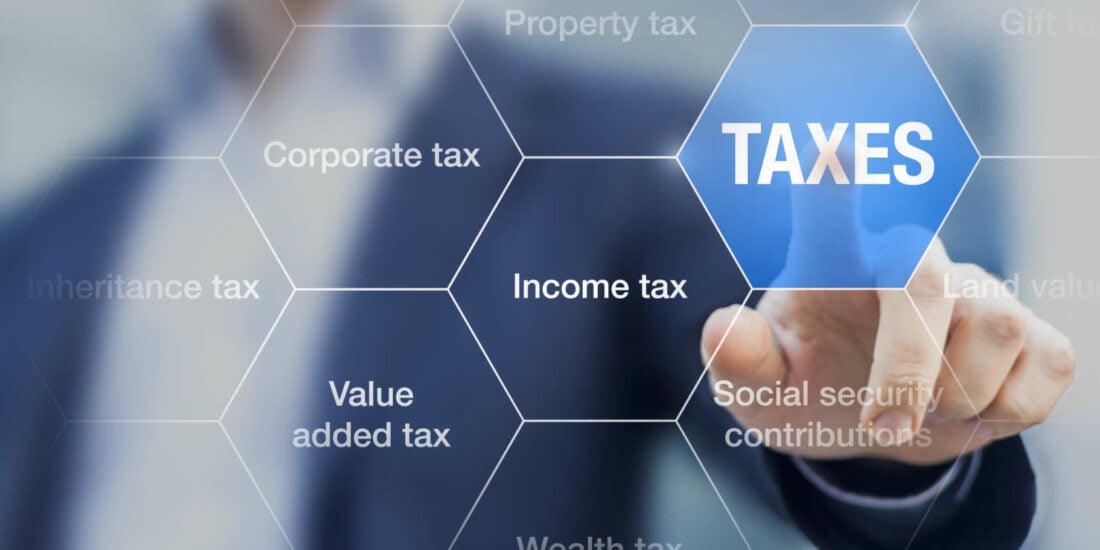
Tax Changes and Our Tax & Trust Committee
This article, by members of the Committee, outlines the work of the young Tax and Trust Committee and highlights some legislative changes made this year to the income tax regime in Singapore.
Introduction to the Tax and Trust Committee
Established in 2020 during the COVID-19 pandemic, the Tax and Trust Committee is a relatively new Standing Committee of the Law Society.
The Committee focuses on developing interest in, and growing the specialisation of, tax and trust law among legal practitioners in Singapore, as well as enhancing external relations with stakeholders in the public and private sectors.
In relation to education and training of legal practitioners, past activities include webinars for members of the Law Society, such as webinars on Singapore’s role as an International Trade and Wealth Management Centre: A Tax and Trust Perspective, held on 9 March 2021 and 20 April 2022. The Committee also collaborated this year with the Family Law Practice Committee and the Probate Practice Committee in jointly organising a webinar on Divorces, Deaths and Taxes – Tax Considerations in Family and Probate matters, held on 25 July 2023.
On external relations, the Committee has provided feedback over the years to the Ministry of Finance and the Ministry of Law on pertinent issues. Student Outreach sessions have been conducted to law students, on 13 and 15 October 2021, and on 6 October 2023.
Members of the Committee keenly track developments in tax and trust matters, such as the annual Budget Statement in Parliament, and changes brought about by amendments to our tax and trust laws. The annual Income Tax (Amendment) Act incorporates the tax changes announced in the annual Budget Statement, and also covers non-Budget changes on international developments and results of the Government periodic reviews of tax practice and policy. These have included enhancing the statutory powers of the Comptroller of Income Tax (Comptroller) and other statutory authorities, in respect of taxes administered by the Inland Revenue Authority of Singapore (IRAS).
Tax Changes in 2023
Following public consultations held in June 2023, the Income Tax (Amendment) Bill 2023 was introduced in Parliament on 18 September 2023. The Bill was debated and passed by Parliament on 3 October 2023. The President gave his assent to the Income Tax (Amendment) Act 2023 on 17 October 2023. Among the Budget tax changes are:
- Introduction of Enterprise Innovation Scheme: This scheme was introduced to encourage businesses to engage in research and development (R&D), innovation and capability development activities. Under the amendments, existing tax deduction/allowance for qualifying R&D, intellectual property (IP) protection, IP rights acquisition and licensing, and qualifying training expenditure will be enhanced, under amendments to sections 14A, 14C, 14D, 14U, 19B and new sections 14E, 37R and 37S, among others. In particular, businesses will benefit from enhanced tax deduction/allowance of 400% for up to S$400,000 of qualifying expenses incurred for each qualifying activity per Year of Assessment (YA) save that the enhanced tax deduction/allowance for IP rights acquisition and licensing will only be available to businesses that generate less than $500 million in revenue in the relevant YA. Additionally, the scheme introduces a 400% tax deduction of up to $50,000 for qualifying innovation expenditure incurred on qualifying innovation projects carried out with approved educational or research institutions. These measures will take effect from YA 2024 to YA 2028 (both years inclusive).
- Introduction of Philanthropy Tax Incentive Scheme for Family Offices (FOs): This pilot scheme under a new section 37AA was introduced with a view to strengthen Singapore’s position as a regional philanthropy hub and encourage FOs to anchor their giving operations in Singapore. Under this scheme, a qualifying donor will be able to claim 100% tax deduction for donations made to approved recipients. Such deduction is to be capped at 40% of the donor’s statutory income. The scheme will be piloted for five years starting from YA 2025 and will be available for qualifying donors with FOs operating in Singapore. To qualify, donors must have a fund under MAS’ section 13O or 13U scheme and meet other eligibility conditions.
The non-Budget tax changes comprise, among others, the following:
- Taxation of gains from sale of foreign assets: A new section 10L was introduced to tax gains received in Singapore from the sale or disposal of immovable or movable property situated outside Singapore (foreign assets) by an entity that belongs to a multinational group which does not have economic substance in Singapore. Such an entity includes a trust. This section applies to gains received in Singapore from a sale or disposal on and after 1 January 2024, if the gains would not otherwise be chargeable to tax as income under section 10(1) or if the gains would otherwise be exempt from tax under the Income Tax Act. Notably, where the sale or disposal of a foreign asset is at a price less than the open-market price of the asset, the Comptroller may treat as the amount of gains received in Singapore, an amount derived by adding the open-market price of the asset to the actual amount of gains received in Singapore and deducting from that total amount the sale price. This tax change aims to align the tax treatment of gains from sale or disposal of foreign assets with the EU Code of Conduct Group guidance, to address international tax avoidance risks. This significant tax change is discussed further, below.
- Submission of income information by intermediaries for Self-Employed Persons (SEPs): A new section 68A was introduced to mandate the submission of SEPs’ income information by identified intermediaries directly to IRAS. This aims to facilitate the income tax assessment of SEPs as well as the administration of schemes that cover SEPs such as the Workfare Income Supplement, and allows the Government to roll out SEP schemes more effectively going forward. The amendments took effect from YA 2024 through a phased implementation approach based on the readiness of the industries, starting with commission agents.
- Simplifying taxation of estates: A concession is made under the Income Tax Act where income of an Estate Under Administration (EUA) may be assessed if the income is distributed to the beneficiary within a period of up to 27 months. The amendments simplify the taxation of estate income by shortening the concession period to within the same year of receipt or such longer period as the Comptroller may permit. To accord parity in tax treatment, the amendments provide a resident beneficiary of EUA with the same concessions, exemptions and foreign tax credits that are available to a resident beneficiary of an Estate Held in Trust. This tax change, which took effect from 30 October 2023, is effected by amendments to sections 35 and 50C and new sections 13QA, 43MA and 50BA.
- Enhancing powers of the Comptroller to prosecute and compound offences on automatic exchange of information (AEOI): Instead of the Public Prosecutor giving his consent for the prosecution of offences under section 105M, which relate to AEOI, section 101 was amended to empower the Comptroller to consent to the prosecution of such offences and also to compound such offences on AEOI. This amendment took effect from 30 October 2023.
- Empowering Comptroller to issue Notice To Attend Court (NTAC): Instead of criminal proceedings being initiated by filing a Magistrate’s Complaint under the Criminal Procedure Code, a new section 102A has empowered the Comptroller to commence prosecutions by issuing NTACs to persons whom the Comptroller believes, on reasonable grounds, have committed offences under the Income Tax Act or its subsidiary legislation, that is punishable by fine or by imprisonment not exceeding 12 months or both. Similar amendments have been made to the Goods and Services Tax Act 1993 and the Property Tax Act 1960. These amendments come into operation on 1 January 2024.
Special Focus on New Tax on Gains from Sale of Foreign Assets
Tax is payable only on income, not capital gains. Or so we thought. Bilateral tax treaties typically allocate the right to tax gains from the sale of investments situated in one country to the country where the owner-seller is resident. So the right to tax Singapore-resident investors on disposals overseas lie with Singapore, on the reciprocity that the counterpart treaty country gets to tax gains from the disposal of investments in Singapore by investors based in the other country. Although in its tax treaties Singapore may have negotiated the right to tax its residents on gains from their investments abroad, it actually has no capital gains tax.
However, the European Union (EU) regards double non-taxation as harmful tax competition with the EU. Since the countries of the EU have capital gains tax, for a third-country to not tax capital gains is an external challenge to the EU countries’ tax bases, and is liable to get a country put on the EU’s list of non-cooperative tax jurisdictions, which Singapore would want to avoid.
According to the EU Code of Conduct Group, capital gains constitute passive income (as opposed to originally being non-income). So a country that does not treat capital gains as income which is prima facie liable to tax contravenes the EU’s “international tax standards”. Following this logic, a third-country may be permitted to exempt capital gains from tax only where there is “real activity” in its jurisdiction.
In short, the new section 10L, on gains from the sale of foreign assets, defers to the EU’s requirements on how a co-operative jurisdiction should deal with capital gains from abroad.
During the Parliamentary debate on this amendment, the Minister moving the Bill stated that foreign sourced disposal gains will be taxable when received in Singapore by entities of multinational enterprise groups that do not have economic substance in Singapore, and that the policy objective of the amendment was not to tax capital gains.
Members of Parliament speaking on the amendment:
- described it as having the broad effect of deeming as “income” in nature, gains which prior to the amendment may have been characterized as capital gains;
- called it significant as it marks a key and fundamental shift in Singapore’s long-standing policy of not taxing gains of a capital nature; and
- commented that previously, the cornerstone of Singapore’s tax system was that it does not tax capital gains, and that this tax change introduces capital gains tax into the Singapore system and perhaps represents a fundamental change to our tax system.
In reply, the Minister reiterated that the proposed new tax treatment (now passed into law) does not represent a shift in our broader tax policy on capital gains and that it was not the intent of the proposed amendments to tax capital gains in Singapore.
Responding to queries in Parliament on how IRAS would assess economic substance, the Minister said IRAS will provide industry with guidance, which IRAS aims to publish by the end of this year.
Two brief comments may be made. First, with this tax change taking effect from 1 January 2024, the IRAS guidance due by the end of this year, although not law, cannot come too soon. Secondly, the application of this new “capital gains” legislation may be the subject of tax litigation in the near future.
Conclusion
The authors, who are members of the Tax and Trust Committee, trust this brief overview of the Committee’s work and recent tax deveopments resonates with members, and look forward to greater interest from, and participation by, members in the specialized area of tax and trust law in the new year.
Reference materials:
- Income Tax (Amendment) Bill, available at: Income Tax (Amendment) Bill – Singapore Statutes Online (agc.gov.sg)
- MOF’s press release Summary of Responses to Public Consultation Summary of Responses to Public Consultation available at MOF | Press Releases
- Summary Table on Proposed Budget Changes to the Income Tax Act available at annex-a—summary-table-(budget).pdf (reach.gov.sg)
- Summary Table on Proposed Non-Budget Changes to the Income Tax Act available at annex-b—summary-table-(non-budget).pdf (reach.gov.sg)
- What is the EU Code of Conduct? https://www.consilium.europa.eu/en/council-eu/preparatory-bodies/code-conduct-group/
- EU Code of Conduct Group report, 14674/22, 24 Nov 2022
- Parliamentary Debates Singapore, Tuesday 3 October 2023 https://www.parliament.gov.sg
This article is for general information only and does not constitute legal advice. The views expressed in this article are the personal views of the authors and do not represent the views of their organisations.






